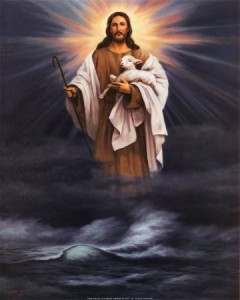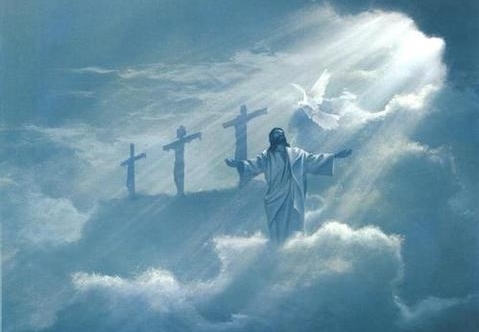The clearest and purest understanding of Jesus I ever heard came from an old Chinese Buddhist woman who had fled her country during the Cultural Revolution. Not burdened with the encrustations of Christianity, she spoke with an insight that left one speechless about both Buddha and Jesus.
 I met her in a small park in Silicon Valley, as I was recovering from a life-threatening illness 20 years ago. The insights into Siddhartha and Jesus she non-verbally conveyed were so vivid, and distinctly human, that they remain with me to this day. The essence of Jesus she communicated (which was nearly absent from my religious upbringing) is forgiveness, including of oneself.
I met her in a small park in Silicon Valley, as I was recovering from a life-threatening illness 20 years ago. The insights into Siddhartha and Jesus she non-verbally conveyed were so vivid, and distinctly human, that they remain with me to this day. The essence of Jesus she communicated (which was nearly absent from my religious upbringing) is forgiveness, including of oneself.
Raised as a Catholic when the Mass was in Latin, I was compelled to go to church six days a week (five times before school, once on Sunday, when it was a mortal sin to miss). Though I was an altar boy and favorite of the priests (there was no pedophilia in our parish that I know of), after a year of study and self-inquiry, I came downstairs one Sunday morning as a senior and said I wouldn’t be going to church that day or ever again. In over forty years, I have never doubted that decision, though it has cost me dearly.
Even so, since the encounter with a living buddha (the old Chinese woman), I sometimes find myself reflecting back on my childhood of Church conditioning, and questioning if there is any truth to Christianity’s distorted story about Jesus.
It’s become fashionable in some circles to suggest that Jesus never existed, that he’s an entirely fictional character, invented by the patriarchal founders of the Roman Catholic Church. As besotted and misbegotten as the Catholic Church is (founded not by Peter but by the Roman Emperor Constantine from a motive that had little or nothing to do with spirituality), Jesus lived and taught and was crucified.
Beyond that, we can be certain of very little. One thing is clear however—the cornerstone of Christianity, decreed and set in place by the Council of Nicaea in 325 (that Jesus was God, not man) is preposterous on the face of it. Though the truth is heresy to Christians, saying Jesus is God is the true blasphemy.
Even so, something ineffably great happened with Jesus’ life, and something inexpressibly tragic occurred with his death. Stripping away all the half-baked misinterpretations and obfuscations, Catholic misconducts and Protestant misconstructions, what was it? Can we gain a core insight into Jesus’ mission, and does it have any relevance for our world?
I feel that for many thousands of years, since long before the time of Jesus, there has been the intent, derived from the immanent intelligence of the universe and flowing through human beings, to bring about a radical change in human consciousness and human nature.
consciousness and human nature.
In this view, consciousness is not what we have as sentient humans, but what we have to awaken as sapient human beings.
We are the only sentient (fully self-aware and potentially self-knowing) species on this planet, conscious of our consciousness, participating, with the cosmic mind when we are deeply and daily self-knowing, in the ongoing creation of consciousness.
Jesus was not God, nor some unique and indescribably special gift from God, but perhaps the most poignant attempt to bring about radical change in human consciousness in human history. Contrary to accepted Christian theology, Jesus was not meant to die on the cross, but change the human heart.
His disciples, having witnessed Jesus’ mission go terribly wrong, fled in fear as Jesus was scourged and nailed to a cross. Riven with guilt and loss and confusion, they and their followers invented the story that Jesus was meant to die for our sins on the cross all along. So they would redeem themselves by being martyred as he was.
That is the false foundation on which Christianity built the grotesque structure of power and wealth of the Roman Catholic Church—the antithesis of what Jesus lived and taught. Now it’s crumbling, along with the other cornerstones and pillars of western civilization. Will we wait until it’s all just rubble around us before digging our own well, and helping to pour the foundation within ourselves for a true global civilization? If we do it will be too late, at least for the foreseeable future.
Jesus represents not a supernatural mystery, as Christians maintain, but the unresolved mystery of man. His last words (“My God, my God, why have you forsaken me?”) echo with pathos through the ages. They are our riddle to resolve, because Jesus was a man, and was betrayed by men and women.
 The guilt-ridden/guilt-alleviating belief that Jesus was born to die on the cross for our sins has been a very clever evasion of responsibility for generations of Christians, from Jesus’ time down to ours, allowing people to avoid responsibility for themselves and humanity. So what went wrong with Jesus’ mission? How could Jesus have gone from a triumphal, prophecy-fulfilling ride into Jerusalem on the back of a burro, to being scourged and nailed to a Roman cross?
The guilt-ridden/guilt-alleviating belief that Jesus was born to die on the cross for our sins has been a very clever evasion of responsibility for generations of Christians, from Jesus’ time down to ours, allowing people to avoid responsibility for themselves and humanity. So what went wrong with Jesus’ mission? How could Jesus have gone from a triumphal, prophecy-fulfilling ride into Jerusalem on the back of a burro, to being scourged and nailed to a Roman cross?
Illumined or nearly so, Jesus was a man, and as a man, he made mistakes. His fundamental mistake seems to have been that he thought he had vanquished evil during his time of trial in the desert. But it just withdrew, and laid a trap for him.
The equanimity with which Jesus then bore his fate was one of the most extraordinary acts in human history. But was it his fate, or did destiny catch up to him?
If fate is a true thing–the potential for human realization infused by cosmic intelligence–then destiny is a false movement, both personal and collective. Jesus seems to have transcended personal destiny, but the dark destiny of his people overtook him. Why did it do so?
Jesus apparently overestimated the people of his time, and underestimated the evil in human consciousness. It’s hard to make either mistake in our age. He then accepted the outcome, even if he didn’t understand it, uttering the seven most sorrowful words in western history: “My God, why have you forsaken me?”
I feel there’s an immense intent in and beyond human consciousness to see humanity flower. But there are also self-hating and life-hating forces in human consciousness, born of the wrongful use of ‘higher thought,’ that want to destroy the human potential for true consciousness.
There’s nothing supernatural about either movement, nor is there some kind of celestial war between good and evil being played out in the world. What ultimately happens with humanity has cosmic implications perhaps, but surely humankind isn’t the only species in the universe threatening to flame out in the crucible of consciousness.
Jesus did not fail, but his mission did, and we got Christianity instead. Don’t get me wrong; Catholicism and Christianity haven’t been all bad. But they have been an essentially false movement, flowing from a deeply false premise. Now that we’re at the end of Christianity’s long hold on the western mind (as evidenced by all the dangerous reactions to preserve or return it to its supposedly pure roots), what is to be done?
The creation of a new religion is neither desirable nor necessary. Organized religion has served its limited and dubious purpose where the spiritual life of humanity is concerned.
But if people go beyond the divisiveness of belief, organized religions can perhaps still serve as mainstays of community, and living archeological sites of prior religious meaning.
The essential thing, whether one feels the fathomless pathos of Jesus’ crucifixion or not, is to dig one’s own well within. For the infinite wellspring is still present, and will always be there, through the present, for the questioning, self-knowing human being.
Martin LeFevre
Link: Bach, Crucifixus: http://www.youtube.com/watch?v=C8l79uX4Fuk


1 comment
Excellent article by the way, great writing. Religion is imperative for the masses without the street skills of life. Im not talking of day to day eating, working and sleeping out of necessities, Im speak more in the way of logic and ethics. Religion is a concept and or a theory in itself. There is a beginning and a definite ending to the humans eye but many have a need to fill there empty void of the unknown. Recently we have entered a time of higher education and with it have little regard for faith and pointless socialistic leadership. Some would agree its the age of Aquarius and this would be the trend of swelling knowledge and dismay for the illogical and conservative approaches. This would be the simplistic reasoning why socialism wreaks havoc on democracy. The two conflict. Very much like religion and government.